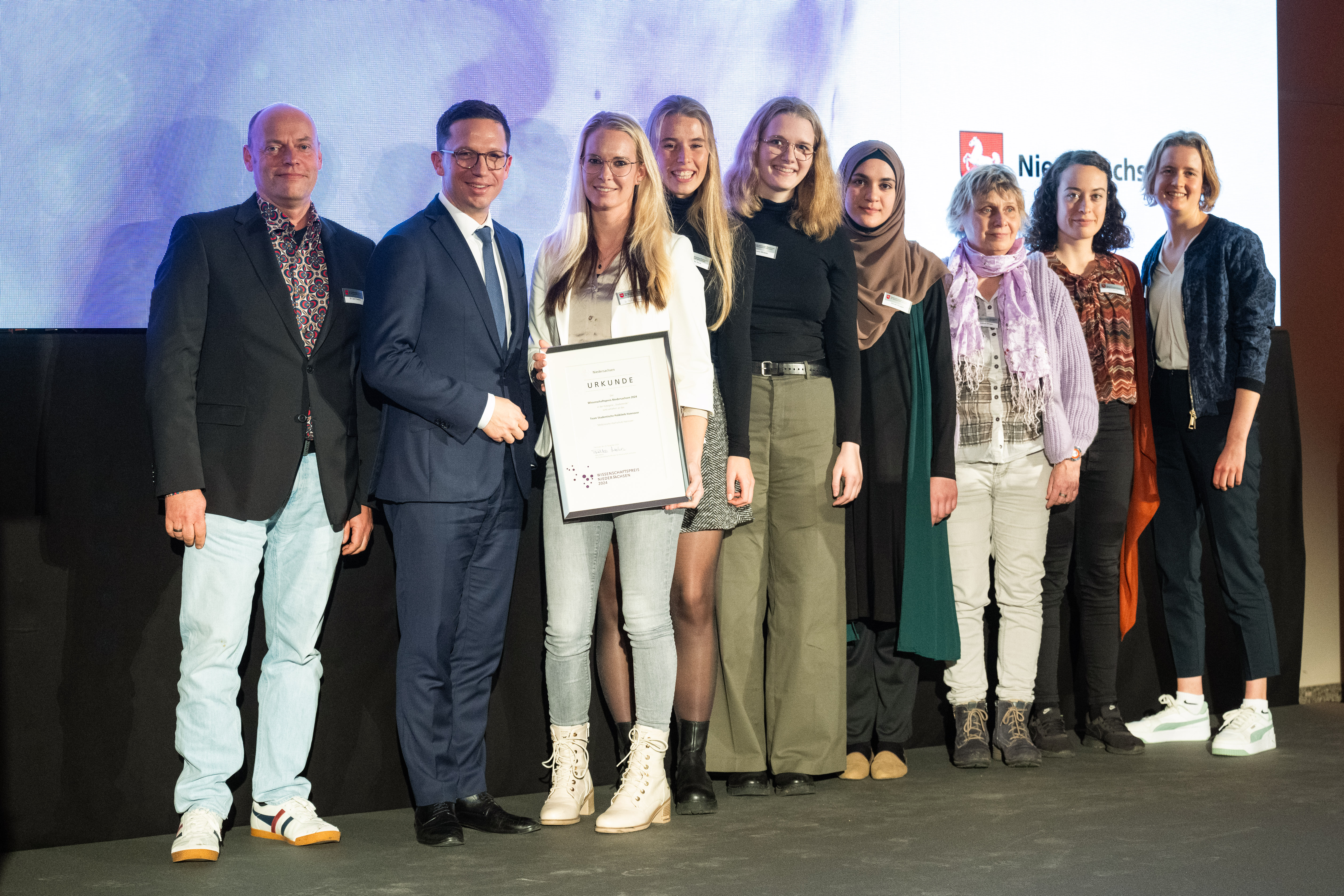Outstanding commitment: medical students gain their first practical experience in the student polyclinic, helping people without health insurance.

Five years ago, a student idea became reality: since 2019, students from the Hannover Medical School (MHH) have been providing free medical care for people without health insurance under medical supervision in the Caritas practice at Leibnizufer in Hannover. At the Student Polyclinic Hannover (StuPoliH), medical students at MHH gain their first valuable practical experience while also doing social work. Last night, this work was honoured with the Wissenschaftspreis Niedersachsen 2024 in the ‘Students’ category.
‘Making life a little better every day’
‘This year's prizewinners impressively demonstrate how our science in Lower Saxony is a driving force for the development of our state and contributes to making life in Lower Saxony a little better every day,’ said Lower Saxony's Minister of Science, Falko Mohrs, at the award ceremony at the Landesmuseum in Hanover, with all the award winners in mind. ’And the prizewinners show: Our universities are training the well-qualified and committed specialists we need for our economic progress and public services. I warmly congratulate all the award winners.’ This year, the minister presented the Wissenschaftspreis Niedersachsen to four scientists who have made outstanding contributions to the development of universities in Lower Saxony, as well as three students and the StuPoliH team from the MHH.
Valuable practical experience enriches training
‘The StuPoliH uniquely combines civic engagement and application-oriented learning as part of medical studies. This gives our students the opportunity to directly experience and understand that our healthcare system still faces a number of unresolved challenges,’ explains MHH Dean of Studies and StuPoliH co-initiator Professor Ingo Just. MHH President Professor Michael Manns adds: ‘Our students also follow the MHH motto “Every day for life”. They are motivated, socially committed and capable. I am very pleased that the commitment of the student polyclinic has been recognised with the Wissenschaftspreis Niedersachsen and I offer my sincere congratulations.’
From the third year of their studies, medical students at the MHH can complete their elective in the Student Polyclinic Hannover (StuPoliH). For eight weeks, every Wednesday, they treat people without health insurance. They are supported by a physician from the departments of anaesthesiology and general medicine, as well as a student tutor from advanced semesters. The practical experience they gain in this cooperation project with Caritas is very helpful for their future medical work. ‘The StuPoliH enriches my training with valuable practical experience and an expanded perspective, and underlines the value of social engagement in the medical field. The project sensitises students to the obstacles that patients face in accessing standard medical care, even in a country with compulsory statutory health insurance like Germany,‘ explains MHH student Joana Wrasse.
’Everyone benefits"
The Student Polyclinic was initiated by Maleen Fiddicke, then a student at the MHH and now a junior physician at the MHH, together with Professor Just, the dean of studies. ‘As a student, I wanted to get involved in the medical field, but a completed specialist training was regularly required. During my research, I came across the student polyclinics in Frankfurt am Main and Hamburg and contacted the one in Frankfurt. That's how it all got started,’ recalls Dr Fiddicke, who is pleased that the clinic is being actively used by both patients and students. ‘It is a meeting that benefits everyone involved. It is particularly important to me that we sensitise our future colleagues to the fact that there are people who fall through the cracks of our social security systems and yet are entitled to respectful treatment and equal care. The earlier we create awareness of this, the more social inequalities in our interactions with one another can be reduced. It starts with each and every one of us.’
Student initiative found immediate medical support
MHH student Mareike Sack is currently the spokesperson for the student tutors in the project. She recently took over this role from Joana Wrasse. The social teaching project is also supported by MHH physicians and general practitioners in private practice. MHH anaesthetist Dr Lars Friedrich has been supporting the StuPoliH since the beginning. He regularly accompanies the students on their missions: ‘Our department is happy to support this social teaching project with its emergency medical experience because we can do two good things here at once. We help students to assess the cases correctly and thus enable medical treatment for patients who are often desperate, uninsured and on the margins of our society. A political discussion about how to integrate them into the statutory health care system does not help these people. In such cases, you just have to do it.’ The MHH Institute of General Practice was also involved in the development, ensures the ongoing implementation in terms of personnel and organisation, and also shares teaching responsibility. The Society of Friends of the MHH provides financial support for the consultation hours.
Text: Bettina Dunker